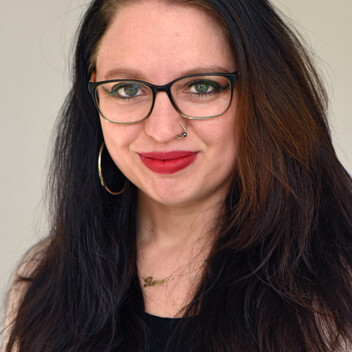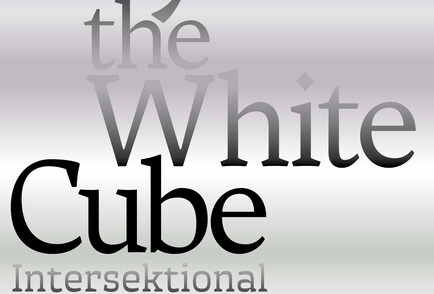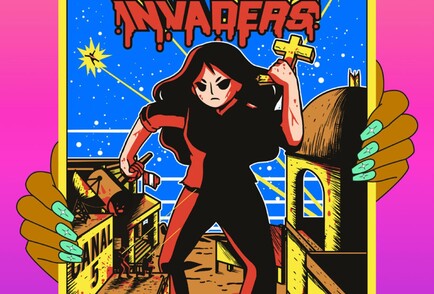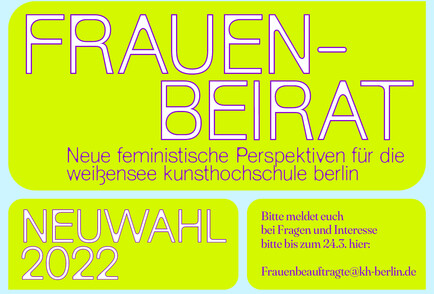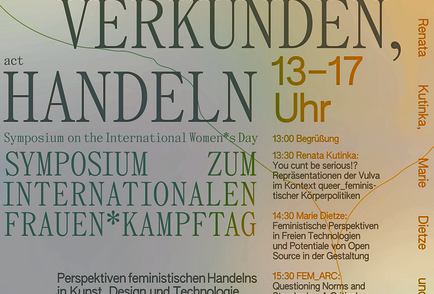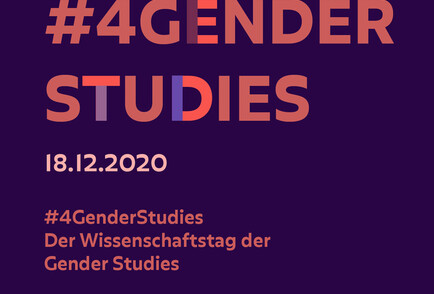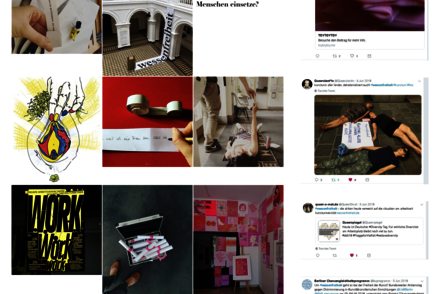Rena Onat
[Vorstellung der Frauenbeauftragten]
[Bio
I am an Art- and Media Studies scholar and have recently finished my PhD thesis with the title "Orientations. Negotiations of disidentification, survival and (un-)archiving in the works of queer artists of color in the German context.". My main research interests are queer theory, critical race theory, intersectionality, visual culture, contemporary art and artistic knowledges. Before starting my position at the khb weißensee I have worked as a a research fellow at the institute of media studies at the University of the Arts in Braunschweig and at the graduate school Helene-Lange-Kolleg Queer Studies and Intermediality at the University of Oldenburg. I have taught seminars at the University of the Arts in Bremen, at the Alice-Salomon-Hochschule in Berlin and in the Foundation* Class of the khb weißensee. I am doing freelance work for various organisations and institutions, among others Diversity Arts Culture, xart splitta e.V., Berlinische Galerie.
[Arbeit der Frauenbeauftragten (Queers + FLINTA* welcome!!!)]
[First of all: Although the title of my office is "Women's Representative", I can be contacted by all those affected by gender and sexual discrimination as well as those affected by structural discrimination in general, as there is currently no Diversity Officer or Anti-Discrimination Officer or, for example, Anti-Racism Officer. I keep the title of Women's Representative because the State Equal Opportunities Act in Berlin (LGG) contains this title and actually only regulates the equality of women and men. My understanding of my work is queer and inclusive for trans, inter, nonbinary people. Please feel cordially invited!
As Women's Representative, it is primarily my task to support the Berlin Weißensee School of Art in a variety of ways to come closer to its claim of gender equality and the realization of inclusion and equal opportunities. The rights and duties of the office are essentially derived from the Berlin Higher Education Act (BerlHG) and the State Equal Opportunities Act (LGG).
As Women's Representative, I work with and for all members of the university: students, employees and teaching staff.
The Women's Representative is elected for 4 years by the Advisory Board, which supports her in her work. I also work together with the Equal Opportunities Commission.
My work includes, for example, advising on gender issues, providing support in cases of discrimination, especially in cases of sexual discrimination, developing and implementing concepts and measures for the advancement of women and advising and supporting all university institutions and committees in matters of gender equality policy. The aim is to embed gender and diversity skills in teaching and university culture.
Even if the proportion of women in almost all member groups of the Berlin Weißensee School of Art is now balanced or even higher among students or in administration, for example, the implementation of gender mainstreaming is far from complete and the sustainable promotion of equal opportunities is still required.
In particular, we need to raise awareness of the fact that the barriers for some groups of women, e.g. due to multiple experiences of discrimination, are still particularly high.
I work on both a structural and individual level against discrimination and for the empowerment of women. My understanding of this work is intersectional, meaning that sexism cannot be thought of in isolation from other social power relations such as racism, homophobia, trans hostility, hostility towards disabled people, classism and social inequality, age discrimination.
In my understanding of my office, it is important for me to recognize the differences between women and I see it as my task to include complex life realities, multidimensional experiences of discrimination and the intertwining of power inequalities in my work.
Even though the office and the legal situation are primarily geared towards the concerns of women, I am also available to university members who are affected by structural discrimination in other ways.
**
Other activities and services offered by the Women's Representative:**
- Acceptance of complaints, advice and support in cases of discrimination and/or sexual harassment and transgression of boundaries
- Consultation hours
- Networking with other women's and equal opportunities officers in Berlin and nationwide in LAKOF and BUKOF
- Advice on integrating gender and diversity in teaching
**]
Why I don't use women* anymore but write all FLINTA welcome
Why I don't write women* anymore. As a feminist, I have been and still am very active in spaces that aim to exclude cis-men in order to center female perspectives and I have actively organized such spaces myself. I have practiced and understood the spelling Frauen* as a way to express solidarity with trans* people and to say that my understanding is not limited to cis women. What I have ignored is the history of the trans* asterisk: It's a sign the trans* community has given itself to include ALL trans* people. It's even on Wikipedia. I only understood this myself about two years ago through input from trans* activists, especially Manuel Ricardo García (who organized the TransInter conference in Munich for many years). I now understand that it is very violent to write women* and thus appropriate a symbol of the trans* community in order to ultimately exclude some trans* people (e.g. male-read people). Unfortunately, a lot of people do that. I myself never meant it that way - that I only address trans* female people. However, it is logical that many trans* folks - e.g. trans* men - either don't feel addressed by this or have already experienced that they are not really welcome. There are, for example, many trans*men who have helped to set up women's lesbian spaces. Are they no longer welcome after transitioning? What I'm doing now is using the word women when I mean all (!) women and making explicit invitations and being more transparent.
Contact
My regular working days are Mon, Tue, Wed, Thu
The best way to reach me is by email
